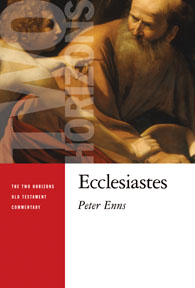 In 1965, the Byrds had a big hit with a song written by Pete Seeger and based on chapter 3 of Ecclesiastes: “Turn, Turn, Turn.”
In 1965, the Byrds had a big hit with a song written by Pete Seeger and based on chapter 3 of Ecclesiastes: “Turn, Turn, Turn.”
Everything on earth has its time and place—its “season,” as the writer (Qohelet) puts it.
There is a time to be born, and a time to die; a time to mourn, and a time to dance; a time for war, and a time for peace, etc.
The Byrds’s tune features great harmonies and gives off a feel-good-be-at-peace-with-the-world-Zen vibe. You know. The ‘60s.
But these ancient words are anything but harmonious and peaceful. We are seeing a faith crisis happening right in front of us.
The “seasons” of life Qohelet speaks of aren’t a comforting thought. Rather they are completely out of human control—birth and death; war and peace; mourning and dancing. These are things that happen to us, ready or not. We do not choose them.
More to the point, for Qohelet the absurd inevitability of life is painful–even more so because he blames God for setting things up that way. (See passages like 1:15 and 1:12, where Qohelet, very early on in his opening remarks, clues the readers in that God is a problem for him.)
Qohelet doesn’t mean that God orchestrates the very details of our lives, but that the events of our lives fit into a “grand design,” a macrostructure from cradle to grave that is outside of our control.
Along with birth and death, war and peace, mourning and dancing, Qohelet lists a total of 14 pairs of activities in verses 2-8, and none of them are aimed at making us feel good.
And whatever notions one might still have that Qohelet is all about peace, love, and harmony dissolve when we come to verses 9-11:
What gain have the workers from their toil? I have seen the business that God has given to everyone to be busy with. He has made everything suitable for its time; moreover he has put a sense of past and future into their minds, yet they cannot find out what God has done from the beginning to the end.
The opening question is rhetorical. The answer is “nothing.”
There is no “gain” from all our toiling, from all the busy-work God has tasked us with, because at the end of the day, God is the one who determines the “seasons” of life—or as he puts it here, “He has made everything suitable for its time” (“suitable” meaning something like “well-ordered” or “appropriate”). There’s nothing we can do to alter that grand scheme.
Qohelet isn’t cheery. He is despondent. What is life all about if our daily buzzing back and forth doesn’t really make a difference?
And, as if to frustrate humanity further, Qohelet tells us that God has made humans conscious of “a sense of past and future.”
Human beings are unfortunately conscious of the passage of time; we can extrapolate on and on, both back in time and forward. We are beings capable of reflecting on the great expanse of human existence.
But this ability to ponder the passage of time does us more harm than good. We still can’t find out what God is up to. We can’t our arms around it.
God is no friend to humanity, as Qohelet sees it. God orders and appoints times, from which there is no escape, and laboring, which brings no profit. This is just the way God wants it, and to top it all off, he gives humanity the ability to comprehend the expanse of time and the futility of it all.
Still, Qohelet finds a way forward, though here we come to another often misunderstood passage in Ecclesiastes (3:12):
I know that there is nothing better for them than to be happy and enjoy themselves as long as they live. Moreover, it is God’s gift that all should eat and drink and take pleasure in all their toil.
There is “nothing better” than enjoying yourself while you’re alive. This isn’t particularly pious, and it isn’t a silver lining.
It’s a confession of resignation: the best we can do is find some joy in the every-day.
Verse 14, as if Qohelet even delights in driving home a difficult point, brings even further clarity to the general point he has been making throughout this passage.
I know that whatever God does endures forever; nothing can be added to it, nor anything taken from it; God has done this, so that all should stand in awe before him.
This isn’t a pious confession of God’s sovereignty, folks. He’s still pessimistic.
The frustrating way God has set up the world will last, rest assured, as we can’t add to or take away from one square inch of it. And God does this so that we should “stand in awe of him.” Just back away and cower.
Qohelet gives here his blunt, even unsettling, observations on what he thinks God is doing. Some might question why a book like this is in the Bible, but I’m glad it is. In it we hear our voices of sadness, depression, frustration, and doubt echoing back from 2500 years ago.
The book gives no quick remedy. It tells us, though, that life is not always grand–and that we are not alone in saying so.
This post is adapted from my commentary on Ecclesiastes (Eerdmans, 2012)
















